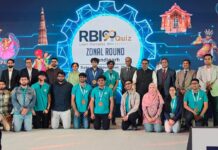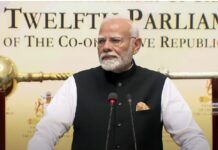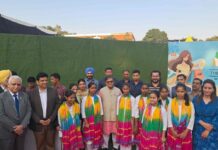Directors of AIIMS from across the country vouch for a consortium on ENDGAME TOBACCO in a National consultation on Tobacco Control priorities in India held in New Delhi
18-07-2023, New Delhi
A national consultation to shape the future of tobacco control in India was jointly organised by Resource Centre for Tobacco Control (RCTC) PGIMER Chandigarh; The Union South East Asia and NAMS New Delhi. It was attended by Directors from 16 All India Institute of Medical Sciences, WHO SEARO and WHO HQ Geneva,Directors of two important think tanks of country- NHSRC and NIHFW; Presidents and Directors of eminent organisations PHFI, IIHMR; Directors and representatives of NGOs and developmental organisations, representation from Ministry of Health and Family Welfare and president from Indian Public Health Association and Indian Association of Preventive and Social Medicine among 50 senior delegates from the country. The aim of consultation was to discuss and share effective strategies in the fight against tobacco use and its detrimental effects on public health, to establish priorities for tobacco control in India and to launch of 2nd compendium of “Good Replicable and Innovative Practices (GRIP) of Tobacco Control in India.
Prof Sonu Goel, Director RCTC PGIMER Chandigarh said that this policy consultation at this important juncture will shape the tobacco control policy in India and establish priorities towards achieving Tobacco Endgame. He also said that the short, mid and long term priorities in tobacco control emanated from the discussions shall be shared with MOHFW, GOI.
Dr. L Swasticharan, Additional Deputy Director General of Health Services, Directorate General of Health Services, Ministry of Health and Family Welfare, Government of India reiterated the importance of replicating good and innovative practices across the country published by RCTC. By disseminating these successful practices, we can effectively tackle the challenges posed by tobacco use and its adverse effects on public health, he said.
Dr. Jagdish Kaur, Regional Advisor, WHO South East Asia and Dr. Vinayak Prasad, WHO HQ, highlighted the importance of making a consortium of important decision makers from AIIMS in eradicating the menace of tobacco from the society.
While highlighting key milestones of India, they told that Countries like New Zealand and many others have made significant strides in creating tobacco-free generations. By studying and adopting these practices, we can accelerate our progress and safeguard the health of our population, they said.
Mrs Preeti Sudan, Former Hon Health Secretary, government of India applauded the remarkable work of RCTC in India. Their relentless efforts and dedication have been instrumental in galvanizing the tobacco control movement across the nation. Their commitment to fostering collaboration, engaging stakeholders, and disseminating best practices has been exemplary, she said
Dr. Shiv Kumar Sarin, President, NAMS Director, Institute of Liver and Biliary Sciences, emphasized RCTC can serve as a role model for all states in the nation, inspiring positive change and effectively combating the menace of tobacco in India. By establishing a central hub of expertise, knowledge, and best practices, RCTC can provide valuable guidance and support to all states in their efforts to implement robust tobacco control measures. In collaboration with NAMS, It can serve as a significant repository of evidence-based interventions, successful strategies, and innovative approaches that have already yielded positive outcomes in various regions.
The presidents of two public health organisations, IPHA and IAPSM said that they will collaborate with RCTC to drive impactful interventions, raise awareness, and advocate for stronger policies.
All Directors of 16 AIIMS agreed to form a consortium for advancing tobacco control and endgame strategies in the country.
















